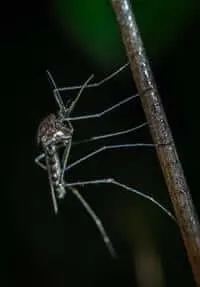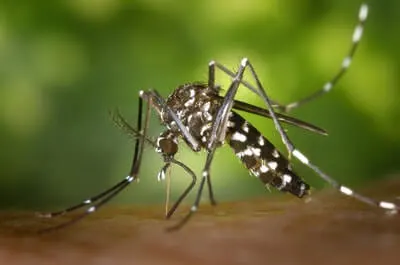Mosquitoes are one of the most annoying pests a homeowner has to deal with. Not only are they a complete nuisance, but they can also carry diseases, and they are difficult to manage.
Thankfully, mosquitoes “bug” researchers, too. So, there have been many studies that try to pinpoint the most effective means of controlling them. There’s a lot of misinformation out there, so I’m going to try to set the record straight.
There are 7 things you need to understand if you are going to control mosquitoes in and around your home.
- Understand what attracts mosquitoes
- Why they hang around doorways
- Where they lay their eggs
- How to prevent mosquitoes in the yard
- How to attract mosquito predators
- Natural Remedies for mosquito control
- Mosquito repellants for your yard that actually work
Let’s delve in with the first important understanding:
What Are Mosquitoes Attracted To?
In order to make your home less desirable for mosquitoes, you must first understand what they’re attracted to. This could be a variety of things, but there are some common factors that make your home and person more welcoming:
What attracts Mosquitoes?
- Standing Water. Mosquitoes breed near standing water, and they will look for calm, protected areas like puddles and birdbaths to lay their eggs.
- Tall Grass. Mosquitoes thrive in tall grass and weeds. The foliage provides protection from predators, so any overgrowth is a prime shelter for a mosquito population.
- Carbon Dioxide. The primary sense mosquitoes use for finding prey is locating plumes of carbon dioxide.
- Heat. When mosquitoes fly towards a plume of carbon dioxide, they use heat to guide them towards the source; this is how they find their prey.
Contrary to popular belief, mosquitoes are not attracted to light. Light can help them navigate towards something, but there is no light or a specific color of light that attracts or repels a significant amount of mosquitoes.
Why Are Mosquitoes Around My Doorway?
The most likely reason mosquitoes are drawn to your doorway is because they are attracted to carbon dioxide and heat. Doors and windows allow ventilation, so there will be more carbon dioxide around these areas than on a solid outer wall. Mosquitoes can sense carbon dioxide from as far as 160’ away, and this is the primary cue they rely on to find prey.
As they approach the CO₂ plumes near doors and windows, they begin to rely on heat. At night, if your home is warmer than outside temperatures, they may sense the temperature difference through drafts or gaps in weather stripping. This heat could be what keeps mosquitoes congregating by your doorway.
Where Do Mosquitoes Lay Their Eggs?
It has long been thought that mosquitoes lay eggs in standing water. However, new studies have observed a majority of mosquitoes in the Culex genus (common mosquitoes) lay their eggs above or near water on hard surfaces. Mosquitoes are most vulnerable during the larval stage, so understanding how they reproduce is key to controlling the population.
Standing water is still the key to finding mosquito breeding grounds. Common mosquito control advice used to be that dumping all standing water in the yard was sufficient for killing the larva. However, now we know that if you allow those items or areas to refill with water, there may be viable eggs attached to neighboring surrounding surfaces. So, along with draining and dumping areas of standing water, you should make sure these things don’t refill to prevent the eggs hatching at a later time.
How To Prevent Mosquitoes In Your Yard
Mosquitoes have the same three needs that all pests have: food, water, and shelter. Unfortunately, you are their source of food, so that is impossible to remove. Mosquitoes find shelter in tall grass and overgrowth, so keeping a well-maintained yard will help remove areas for them to hide.

Water is the most important vector to control. If you live in an area with consistent moisture, or you have an irrigation system, take note of anything in your yard that will collect water, and remove it. Grade or fill low areas that retain water.
If you have standing water in your yard, read this post on how I put a stop to this with a French Drain System.
If you have a larger body of water to treat or marshy areas, it may be easier to spray a larvicide containing Bacillus thuringiensis israelensis. This is a selective insecticide that will only target mosquito larva, and will not disrupt the reproduction of beneficial insects.
Amazon sells a 5-gallon bucket of this larvaecide (20 pounds) that has been deemed organic by the USEPA and will not harm other wildlife. You can check the latest pricing on this product by clicking here.
How To Attract Mosquito Predators
Many are quick to cite bats, purple martins, and other animals as nature’s mosquito warriors. However, while they do eat mosquitoes, these predators typically have a diverse diet and will almost always pass up a mosquito in favor of a moth.
What predators eat mosquitoes? There are two natural predators that have been observed to reduce mosquito populations, and it is due to their ability to eat the larvae:
- Gambusia. These are commonly called mosquito fish and are closely related to guppies. Although they have been used for mosquito larva control, they have become a pest themselves as they quickly populate in large bodies of water. Check with your local extension office before buying these, and do not release them into the wild.
- Dragonfly nymphs. Studies have shown that this is an incredibly powerful natural predator. If you have an area of standing water, you can attract them by installing aquatic plants, and ensuring they have plenty of areas to rest or perch. The adults will also prey on adult mosquitoes, so these are a great predator to attract.
Birds, bats, fish, and the larval stage of many insects will eat mosquitoes. However, the claims that they will eat thousands per day is greatly exaggerated. This is generally only in response to large populations that can occur after hurricanes or other natural disasters.
It could still be beneficial to put up a few birdhouses and bat towers, as they do help to keep populations in check, and these are beneficial predators for many other pests.
Natural Remedies To Control Mosquitoes
If you Google natural mosquito repellent, you will find nearly 30 million websites claiming to have a recipe or plant or some concoction like “lemon juice mosquito repellent” that provides natural protection from common mosquitoes.
While some do provide limited protection, like peppermint oil or aromatic herbs, there is only one formulation that the EPA and CDC have found to be effective, and it is widely misunderstood.
Oil of lemon eucalyptus is considered to be the only effective natural repellent by the EPA; only DEET and picaridin are more effective. Oil of lemon eucalyptus is the byproduct of distilling lemon eucalyptus oil from the leaves of the Corymbia citridora tree.
During the 60s, there was a large study conducted to find natural insect repellents, and many oils were found to have mild effectiveness; namely, lemon eucalyptus oil. However, upon further study, it was discovered that the byproduct of this oil was far more effective and less volatile. You will find both ingredients in natural repellents, but they are very different compounds.
Oil of lemon eucalyptus will be listed as OLE, PMD, or para-menthane-3,8-diol on repellent labels.

Mosquito Repellents For Your Yard
The best repellent is a yard free from overgrowth and stagnant water. However, mosquitoes can still be a problem if you live near water, wooded areas, or have neighbors with standing water in their yards.
There are a few effective repellents that will work for patios and other areas where people might congregate. Most repellents have short-range effectiveness, so they will only keep mosquitoes from a small area.
- Fans. Mosquitoes are weak fliers. Place a few oscillating fans around your patio to keep them from flying into the area. With this method, speed is key, so put your fan on the highest setting possible.
- Citronella. This is the most popular repellent among homeowners and comes in many forms. It is mildly effective, but only in very small areas. The range on most candles is three feet, so they work best in conjunction with other repellents.
- Mosquito netting. While commonly thought of as an unattractive solution, netting is quite effective at keeping mosquitoes away. Plus, there are now many stylish options that will help protect your patio area.
- Traps. While not technically a repellent, there are some highly-effective traps on the market. They produce heat and carbon dioxide to lure in mosquitoes and then trap them with various methods. They have a large range but will need to be cleaned every few weeks.
All of these repellents target a specific weakness of mosquitoes. Use a combination of strategies to create an effective barrier.
Conclusion
Mosquitoes are an annoying part of the ecosystem, and they’re a common pest that homeowners have to deal with. The best way to keep them out of your home is to keep them out of your yard. But, like most pests, keeping up with routine maintenance will help keep insects outside where they belong.
Replace torn window screens, damaged weather stripping, and repair cracks and openings around windows and doors. Not only does this help with the efficiency of your home, but it is the first line of defense with other insects and pests.
Related Questions
Will Mosquitoes Bite More Than Once?
Mosquitoes eat until they’re full, and then they rest for a few days, lay eggs, and start over. If they are interrupted during feeding, they will either circle back to the same person or find someone else until their abdomen is full.
Will Mosquitoes Bite A Drunk Person?
Surprisingly, yes. Mosquitoes are attracted to drunk people, although it has nothing to do with a blood alcohol. Drinking can raise your body temperature and increase sweating; two things that attract mosquitoes.
Does Campho-Phenique Repel Mosquitoes?
No. The limited success is probably due to the camphor, which is considered a repellent. However, camphor is dangerous to apply to large areas of the body, so this product should not be used as a repellent.
Will Mosquitoes Breed In Moving Water?
Mosquitoes breed in still water with vegetation for food. However, a pond with a small aerator may not be enough to deter them if there are still shallow, calm areas for them to lay eggs. Mosquitoes will not breed in rivers or creeks.
Do Spiders Eat Mosquitoes?
Yes. If a mosquito flies into a web, a spider will eat it. However, spiders do not actively hunt mosquitoes.
Do Hummingbirds Eat Mosquitoes?
Yes. However, when not eating nectar, 70% of their diet consists of spiders.
To learn more about controlling pests and the complex interconnection that different species of pests have, be sure to read How To Reduce Pests In Your Home: Insects, Rodents, and More.
As a homeowner, I am constantly experimenting with making the structure of my house more energy-efficient, eliminating pests, and taking on DIY home improvement projects. Over the past two decades, my family has rehabbed houses and contracted new home builds and I’ve learned a lot along the way. I share my hard-learned lessons so that you can save time and money by not repeating my mistakes.


Leave a comment
You must be logged in to post a comment.